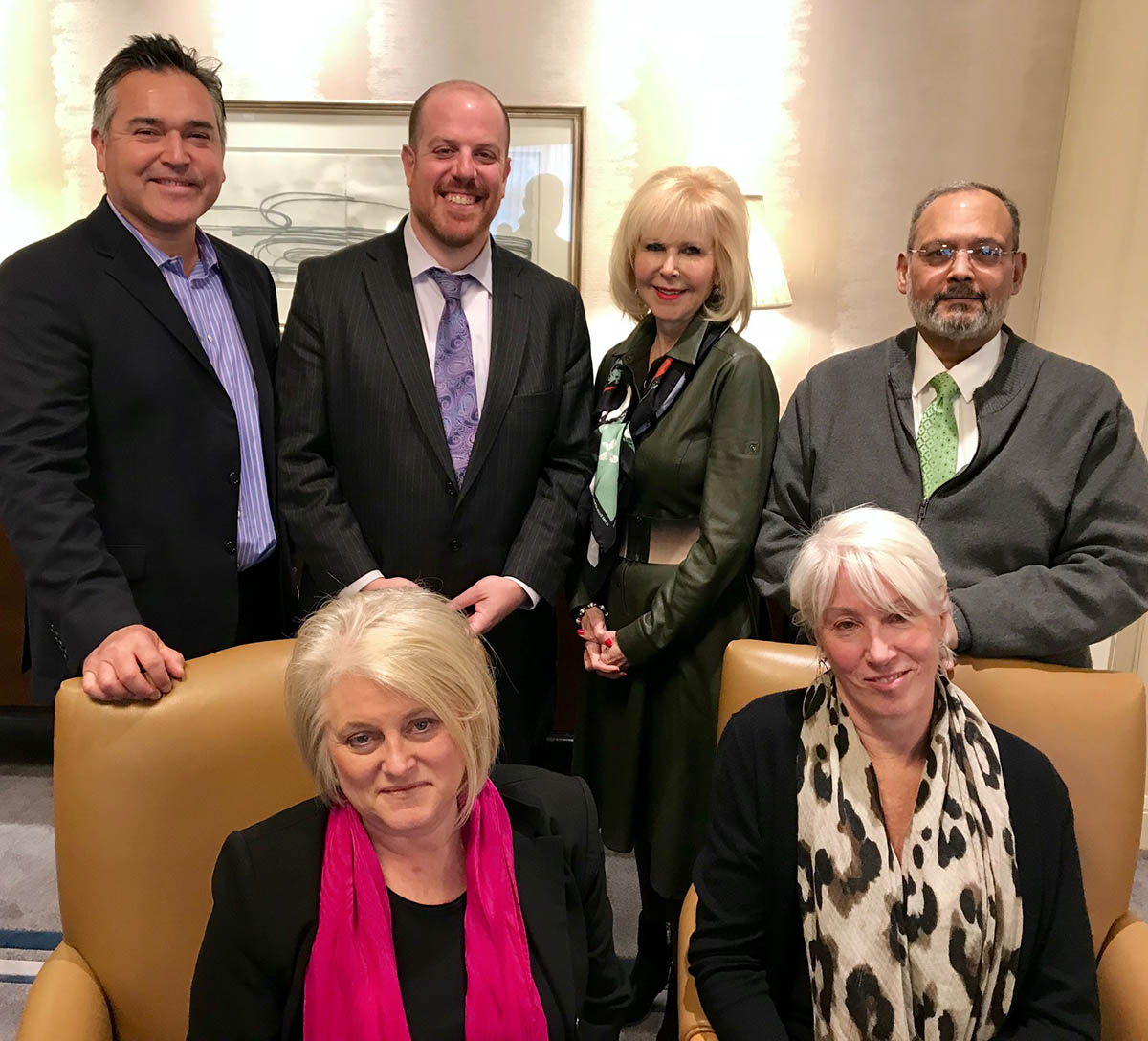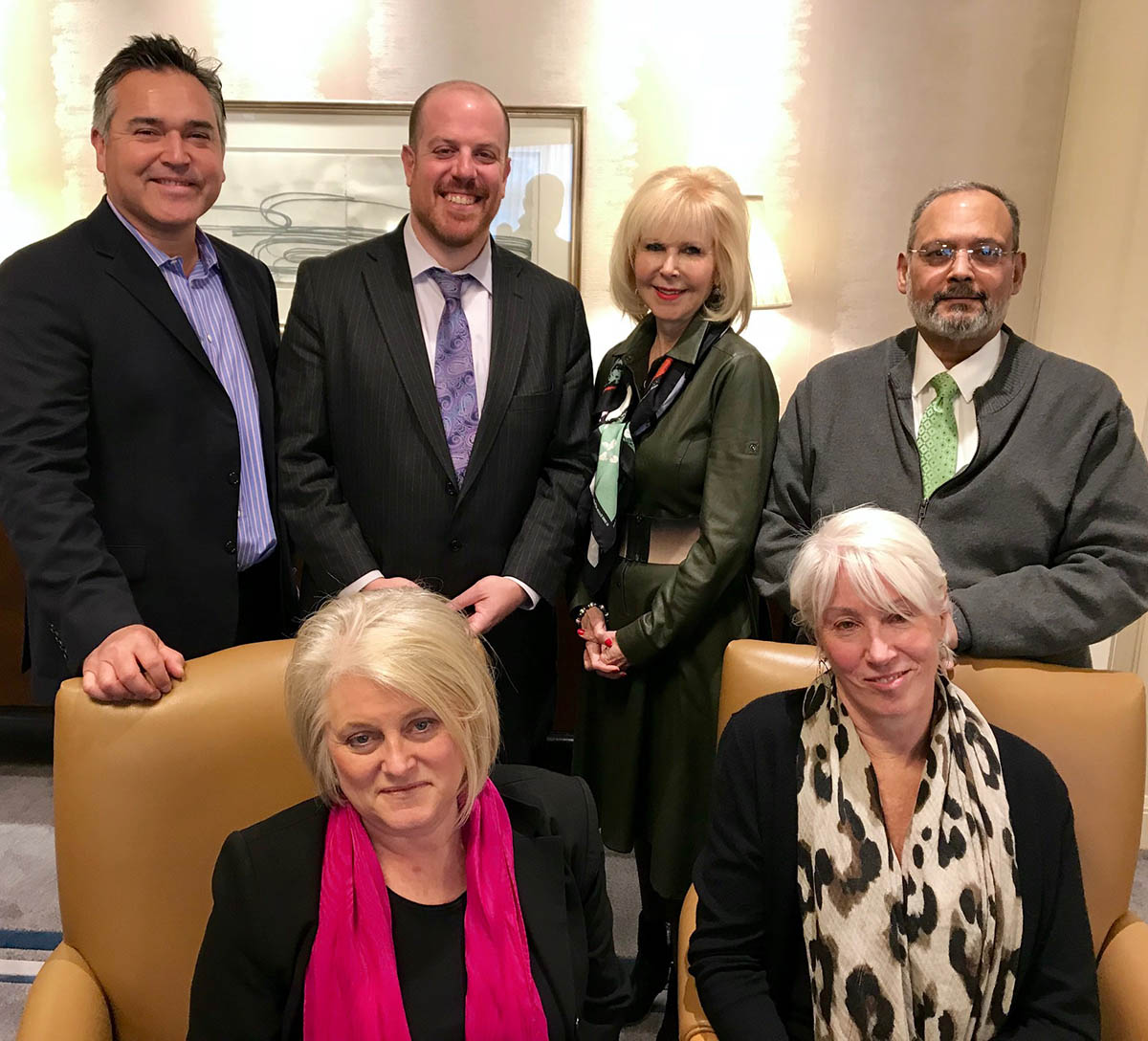Think Tanks
Better Beginnings, Fewer Endings Think Tank (TM)
March 8, 2019
“The spike in the use of alcoholism as a factor in family law cases, the predictable rise in marijuana usage and its growing acceptance, and what we do and do not know about vaping”
Saturday, March 8, 2019
Today, state courts are being forced to address emerging trends in substance abuse, especially in family law cases. These trends – the spike in the abuse of alcohol; in cannabis consumption given its growing legalization in many states, and the use of vaping or electronic nicotine delivery – were high on the list of issues discussed at Allen & Glassman’s Better Beginnings, Fewer Endings Think Tank™ discussion and brunch on Saturday, March 8 at the Peninsula Hotel.

Todd Glassman and Gemma Allen (center, standing) with Think Tank panelists (also standing) Mike Fonseca and (seated) Judge Raul Vega and Dr. Sarah B. Warren and Cheryl Berdelle.
Speakers were Dr. Sarah B. Warren, a psychologist specializing in addiction and intervention; Mike Fonseca, national sales manager of Soberlink, a system for accountability for sobriety through a comprehensive alcohol monitoring; the Honorable Raul Vega, presiding judge of the Domestic Violence Division, Circuit Court of Cook County; and Cheryl Berdelle, a family lawyer who often serves as a Child’s Representative. Gemma Allen, founder and principal partner at Allen & Glassman, moderated the discussion.
Highlights/Takeaways
Mike Fonseca explained the background about the Soberlink electronic device and how it is helping family courts monitor the use of alcohol consumption during custody visits. Previously, alcohol monitoring relied on infrequent, random lab testing, causing many drinking incidents to go undetected. Soberlink allows for real-time testing multiple times a day, either daily or only during parenting time. The company has a family law parenting program.
Recently, Soberlink brought together a panel of experts to help determine the most effective ways to use the product, and the results were published in the Journal of Addiction Medicine. The company has a Best Practices document posted on its website.
Gemma said that they find clients are less likely to use alcohol and drug treatment programs these days. Instead, an increasing number say they won’t stop drinking, and Cheryl noted the recovery rate of alcohol abuse is only about 7 percent nationally. Additionally, the use and abuse of drugs, primarily cannabis, is becoming more frequent as a growing number of states have legalized recreation smoking.
Todd Glassman said that a bigger issue is whether parents smoke pot around their children and the effect it may have on family members. If parents have always done pot, they may be more permissive, which further complicates the matter.
Sarah talked about the differences between alcohol and pot and its impact on the body. Alcohol leaves the system quickly, but the effects of pot are longer-lasting. People can be irritable when sobering up, but we don’t really have test results that tell us about parenting judgment during this period. Those who drink to excess can fall into a deep sleep under its effect, so if their child tries to arouse them, they may not respond. Drugs can cause psychotic disorders that can impact a parent and their children throughout their lives.
Gemma noted that pot use by teens is especially dangerous and can affect learning abilities because it harms the devilment of the adolescent brain.
Judge Vega said that in the domestic violence cases, the court is effective in its efforts to legally protect the victims. However, the problem of domestic violence cannot ultimately be resolved until the courts can provide more services to the potential or actual perpetrators in whatever form is appropriate to change or modify their behaviors or addictions. He remarked that as a society, we need to focus on the prevention of domestic violence in the first place in order to end or at least minimize the violence cycle and its consequences for the victims and families.
Sarah said she strives to educate individuals and the entire family when possible so they have clarity about the physical and psychological impact of their alcohol or drug abuse. If parents have a child who abuses drugs or alcohol, she encourages them to “keep a roof over their head” and not consider that action as “enabling” but taking care of someone you love and support them until they’re functioning at the highest level. In some instances, there may be a need to remove the child from parents who are, for example, substance-abusing themselves.
The conversation turned to the role that child representatives play in court. Cheryl said the terminology used to describe their role has been problematic. Twenty years ago, there was an incredibly negative judgment, about the person then alcoholism was labeled a disease. Now there’s a whole range of beliefs on this issue. She said she would like to see a child rep or GAL involved in court cases as soon as possible. The child rep should be fully educated so they are able to educate the litigants.
Todd said that lawyers struggle to have GALs appointed, and Cheryl agreed, declaring that there needs to be more training of GALs and child reps. Gemma said that many judges won’t let a lawyer speak until the GAL is in the room. The judge agreed, saying that child reps always have an opinion worth hearing. Judges should ask child rep specific questions such as whether they read the pleadings and how long has it been since their last visit with the child. Gemma added there also needs to be training on bias, especially as it relates to the child rep’s own relationship with drugs or alcohol.
One attendee with medical expertise, Dr. Max Berdichevsky, added immensely to the gathering’s scientific grasp of the differences between marijuana types and potency (this is NOT your parent’s pot) along with the medical dangers of vaping. Other lively contributors to the discussion, too numerous to name, are appreciated for their comments and provocative questions.
Action Plan
Bob Downs, a past president of the Illinois State Bar Association, suggested that the discussion had been so valuable and timely that we should formulate an action plan to implement the ideas, and the Think Tank agreed. We will reach out to the courts regarding two educational initiatives:
1) Upgrading/updating the training for Children’s Representatives and Guardians in their different but significant and impactful roles; and
2) Requiring that the training includes the potential effects of alcohol, marijuana, and other drug usage by their parents on the children they are representing.
In closing, Gemma praised members of the bench, bar and therapeutic communities for attending Think Tank discussions. Now in its 21st year, the Think Tank has always been about identifying ways to improve the practice of law and the justice system. She concluded that adjusting to the changes in the consumption of alcohol, pot and vaping will be a challenge for families, the courts, lawyers and therapists but that “we will all strive to move forward in a positive direction.”
For more photos, visit the March 8 Think Tank photo album on the firm’s Facebook page https://www.facebook.com/allenglassmanchartered/
